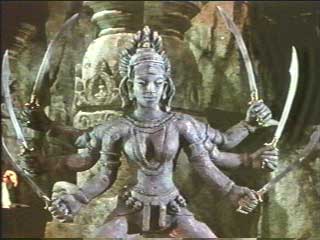New & Improved Hinduism!
Now with Sweet Candy-Coating To Hide Caste System's Rancid Aftertaste!

Opponents of Hindu Depictions Want To Rewrite Textbook History
from Milpitas Post
Igniting
 another battle between religion and scholarship, several Hindu organizations have proposed a revision of ancient Indian history in California textbooks. But some, including scholars and Indian groups who object to the revisions, claim the proposals are an attack on historical accuracy, that the changes are not just religious - they are political.
another battle between religion and scholarship, several Hindu organizations have proposed a revision of ancient Indian history in California textbooks. But some, including scholars and Indian groups who object to the revisions, claim the proposals are an attack on historical accuracy, that the changes are not just religious - they are political.At stake is what 500,000 California sixth-graders will learn about Hinduism as part of the state-mandated curriculum, which covers world religions and the precedent for future U.S. textbooks. The debate flared last November, when the state Board of Education held a public meeting to discuss the revisions, one of the final steps in the state's adoption process which takes place every six years. Madhulika Singh, a Milpitas parent of four and a volunteer with the Hindu Education Foundation, was one of those who raised concerns with the text during the hearing.
She told the committee her 11-year-old son was so embarrassed by what he read that he became ashamed of being Hindu. "My child should not be ashamed because the textbooks are totally different from what we were teaching at home," she explained.
California mandates the study of world religions in its public schools. Ancient India is covered as part of sixth-grade curriculum. But Singh and others worried that the text creates bias against them.
"There are many children, non-Hindu children, who didn't know much about Hinduism or India until they were exposed to it in the sixth grade. When they learn what they read in textbooks they are shocked or hate India and Hinduism," she said. "Before they may have been neutral or ignorant of it; that's better than hating it.."
While several groups, including Jewish and Islamic advocates also requested changes, the majority of the debate came over the Hindu groups' position which has led to ongoing review meetings. The Hindu organizations, The Vedic Foundation and the Hindu Education Foundation, proposed 153 changes, 131 of which were initially accepted by the committee. The changes, which were denounced by scholars and other Indian groups, included rewording "gods" to "God," described women's rights in India as "different" instead of "fewer," and eliminated critical views of the caste system. In one example, the current text read: "The Aryans created a caste system." The proposed revision is: "During Vedic Times, people were divided into different social groups (varnas) based on their capacity to undertake a particular profession."
Anu Mandavilli, an Indian doctoral candidate at the University of Southern California, and activist against the Hindu revisions, called the changes distressing. "The groups involved here are not qualified to write textbooks,"
 she said. "They do not draw lines between myth and history. On their Web site they claim that Hindu civilization started 111.5 trillion years ago. That makes Hinduism billions of years older than the Big Bang." (The assertion has since been pulled from the site.) "It would be ridiculous if it weren't so dangerous," she said.
she said. "They do not draw lines between myth and history. On their Web site they claim that Hindu civilization started 111.5 trillion years ago. That makes Hinduism billions of years older than the Big Bang." (The assertion has since been pulled from the site.) "It would be ridiculous if it weren't so dangerous," she said.The committee, advised by Professor Shiva Bajpai, a professor emeritus in the History Department at California State University at Northridge (who was requested by the groups), approved the majority of the decisions. But a group of professors, led by Harvard Professor Michael Witzel, denounced the revisions in a letter to the Board of Education. In his letter, Witzel alleged the proposed changes "would trigger an immediate international scandal...The proposed revisions," he wrote, "are not of a scholarly but of a religious-political nature." Fifty other scholars signed in support.
The board appointed Witzel and two colleagues to a special committee, outraging the Hindu groups who believed Hinduism should be described by Hindus. In January, the board decided that both groups would discuss point by point which changes could be made based on historical facts. In response, one of the Hindu organizations hired legal representation and threatened action.
The issue over textbook revisions is not new. Various efforts for change have sparked controversies between Japan and its neighbors over World War II, in France and its former colonies over the portrayal of imperialism and in the United States over creationism and Darwinism. Witzel said the controversy in California is all too familiar. "It's whitewashing," he said. "It would provide a completely unhistorical view of ancient India. The devil is in the details, but we'd end up with a textbook which is partly sectarian and partly extreme right wing."
One of the most contentious points for the Hindu organizations is over the "Aryan Invasion Theory," the concept that a group of people from Central Asia who called themselves Aryans came to India around 1500 B.C. and that Hinduism grew out of the culture and tradition those people brought with them. Witzel and many scholars support the theory; the Hindu groups do not. The spokespersons for the Vedic Foundation maintain Aryans and Hinduism are indigenous to India and that linguistic and recent DNA findings disprove the theory. Witzel, a professor of Sanskrit for 40 years, disagreed. "The evidence is all off track," he said. "It only proves that people came to India early."
The groups contend, however, the overall representation of their identity is not fair. Janeshwari Devi, director of programs at the Vedic Foundation and who worked on the textbook issue, said the groups compared text explanations of Christianity, Judaism and Islam, which she said were respectfully portrayed. When they reviewed the Hindu sections, she said the texts were "completely racist."
"Our main concern is for the youth of California," she said.
The opposition readily concedes that the texts are less than perfect. But some groups, including traditionally marginalized Indians, feel the revisions are worse than the original text. Dhillai Kumeran, a San Jose parent, said he was "shocked" when he read the changes. "The way they put it was that they were going to remove stereotypes and have better representation. If they asked me I would have said 'great.' But what they are proposing is like writing U.S. history without the conquest of Native Americans... I have seen the (class) discrimination with my own eyes. It is something that is a fact, and still continuing today and is really a tragedy."

Mandavilli agreed, "Not only don't (they) represent all Hindus, they don't represent us," she said, speaking of other Indian cultures represented in the area and what she considers moderate Indians. "They claim to be the marginalized. But in India they are the ones who are doing the marginalizing."
On Dec. 2, with Witzel's panel in place, the Curriculum Commission voted against most of the revisions it had previously accepted. But in light of the controversies, the board has now appointed a third committee to review the decision-making process.





























0 Comments:
Post a Comment
<< Home